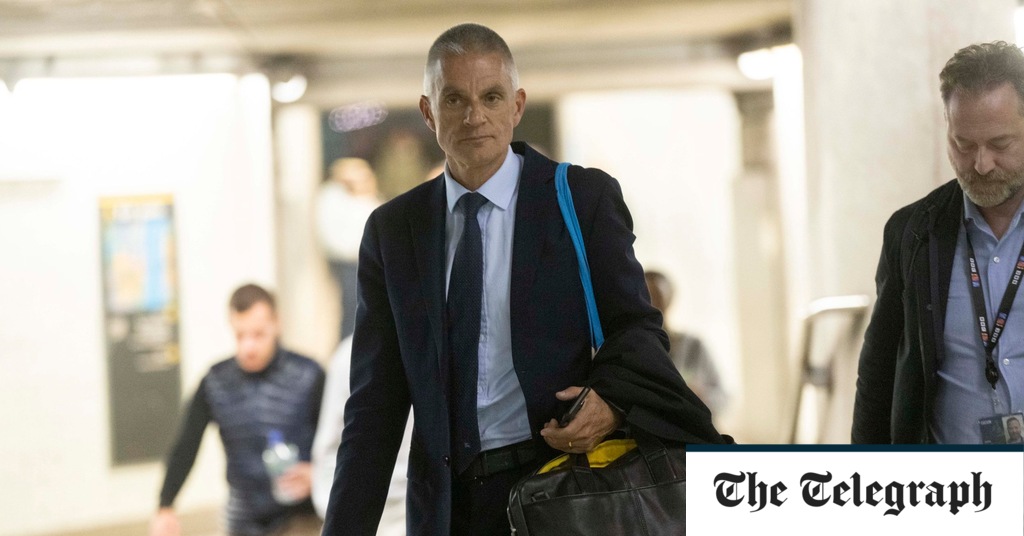BBC has ‘never been so disappointing’, Tim Davie told over Israel …

Tim Davie, the BBC director-general, has been confronted by a Cabinet minister [1]who said he had "never been so disappointed" in the corporation as he had over its coverage of Israel[2]. Robert Jenrick, the immigration minister, made the remark during a behind-closed-doors meeting between Mr Davie and the 1922 Committee of Conservative MPs on Wednesday. Mr Jenrick told the BBC boss that many British Jews had "lost confidence" in the corporation in the last fortnight and urged him to change policy by letting reporters call Hamas "terrorists".
But Mr Davie rejected the suggestion and defended the existing BBC policy[3], which is to state that Hamas has been proscribed as a terror group by the UK Government. The Daily Telegraph understands that Mr Jenrick said the following to Mr Davie, or words to this effect: "I've never been so disappointed in the BBC as I have been this past fortnight. "I worry that the organisation has lost the confidence of many people and in particular the British Jewish community.
"That loss of confidence began with the BBC's refusal to call Hamas terrorists. Will you reconsider that and change your editorial policy?"
'Corporation must remain impartial'
The exact wording of Mr Davie's response is not known, but he rejected the call to change the rules about how Hamas - the terror group whose attack on Israel saw more than 1,300 people killed - is described by BBC journalists. A BBC spokesman also defended the existing approach to describing Hamas, arguing that the corporation must remain impartial in its reporting.
The meeting saw many tough questions aimed at the director-general, according to Tory MPs present in the room. Mr Davie attended the gathering after an invitation was extended prior to the Hamas attack. One Tory MP reportedly received cheers of support from colleagues as she heckled Mr Davie and urged him to call Hamas attackers "terrorists".
The BBC director general is also said to have accepted some mistakes were made[4] in the corporation's coverage of the Gaza hospital explosion, according to Tory MPs. Reports about the incident initially appeared to accept Hamas's claim that an Israel air strike had destroyed the al-Ahli Arab hospital.[5] However, the Israeli government swiftly denied responsibility and published what they said was evidence proving the rocket that had caused the explosion was fired from Gaza - a conclusion that the UK and US governments have both now endorsed.
'BBC staff have been crying in toilets'
Last week, Jonathan Munro, BBC News deputy chief executive, said the broadcaster's "language wasn't quite right" during live reporting of the incident.
In a separate development, The Times reported that the BBC's approach to the conflict allegedly left some staff crying in lavatories and taking time off work. The paper stated that an email detailing concerns, including that the BBC was "treating Israeli lives as more worthy than Palestinian lives", had been sent to Mr Davie. One source was quoted as saying: "Staff have been crying in the toilets and freelancers have been sacrificing earnings by not showing up to work because of the distress caused.
Many people are feeling deeply disturbed." Meanwhile, it emerged that Robbie Gibb, Theresa May's former director of communications, will be among the BBC executives handling a review into the corporation's immigration reporting. During the 1922 Committee gathering, Tory MPs banged their desks when Mr Davie mentioned Mr Gibb's role in overseeing the review.
The review itself had already been announced and is being headed up by Madeleine Sumption, director of the Migration Observatory, alongside Samir Shah, a broadcasting executive. Mr Gibb is one of a number of members on the BBC's Editorial Standards Committee, which has been tasked with handling the report. Mr Davie himself also sits on the committee.
A BBC spokesman defended Mr Davie's decision to attend the 1922 Committee, which is made up of Tory MPs and usually has cabinet ministers present as guest speakers.
The invitation had been extended in July, before Hamas attacked Israel.
The BBC spokesman said the broadcaster's executives regularly met with MPs "across the political spectrum".
References
- ^ confronted by a Cabinet minister (www.telegraph.co.uk)
- ^ over its coverage of Israel (www.telegraph.co.uk)
- ^ defended the existing BBC policy (www.telegraph.co.uk)
- ^ accepted some mistakes were made (www.telegraph.co.uk)
- ^ destroyed the al-Ahli Arab hospital. (www.telegraph.co.uk)